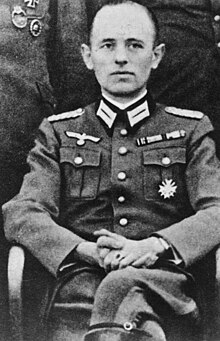General Gehlen
| Reinhard Gehlen | |
|---|---|

Colonel Reinhard Gehlen, c. 1943
|
|
| Born |
3 March 1902 Erfurt, German Empire |
| Died | 8 June 1979 (aged 77) Starnberg, West Germany |
| Allegiance |
|
| Service/branch | Army |
| Rank | Lieutenant-General |
| Battles/wars |
World War II Cold War |
| Awards |
Deutsches Kreuz in silver during the Second World War Knight of Malta |
Deutsches Kreuz in silver during the Second World War
Großes Bundesverdienstkreuz am Schulterband
Reinhard Gehlen (3 April 1902 – 8 June 1979) was a German general who was chief of the Wehrmacht Foreign Armies East (FHO) military-intelligence unit, during World War II (1942–45); spymaster of the anti–Communist Gehlen Organization for the United States (1946–56); and the first president (1956–68) of the Federal Intelligence Service (Bundesnachrichtendienst, BND) of West Germany, during the Cold War.
Gehlen became a professional soldier in 1920 during the Weimar Republic. In 1942, Gehlen became chief of FHO, the German Army's military intelligence unit on the Eastern Front (1941–45). During the second world war he achieved the rank of major general, before Hitler sacked him, because of the FHO’s pessimistically accurate intelligence reports about Red Army superiority. In late 1945, at the start of the Cold War, the U.S. military (G-2 Intelligence) recruited General Gehlen to establish an espionage network against the Soviet Union; the Gehlen Organization (1946), wherein he employed ex–military-officers of the Wehrmacht and Nazis from the Schutzstaffel (SS) and the Sicherheitsdienst (SD).
Gehlen was the first president of the Federal Intelligence Service of West Germany from 1956 to 1968. While the office of president of the BND was a civilian office, he was also a lieutenant-general in the Reserve forces of the Bundeswehr; thus, Reinhard Gehlen was the highest-ranking reserve-officer in the military of West Germany.
...
Wikipedia
